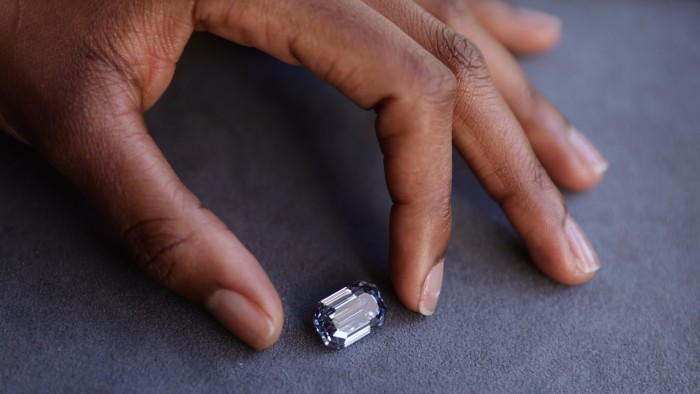Unlock the Editor’s Digest for free
Roula Khalaf, Editor of the FT, selects her favourite stories in this weekly newsletter.
The head of the world’s biggest diamond company has expressed his confidence that the US will remove tariffs on the precious stones that he believes are of “no benefit” to the country.
Al Cook, chief executive of De Beers, told the Financial Times there were “no US diamond mining jobs to protect” and that the company had held discussions with several governments about the matter.
Tariffs were of “no benefit” to the US and “would purely be a consumption tax on the American consumer,” he said. “There would be no jobs created.”
The US is the world’s largest market for diamond jewellery, accounting for about half of global demand, but has no domestic mining or known commercial deposits of the stones.
The tariffs announced last month by President Donald Trump have thrown the diamond industry into turmoil and briefly brought trade in the gems to a “standstill”, according to market participants.
The World Diamond Council, a lobby group that represents the industry, warned today that $117bn in annual revenues as well as 200,000 American jobs in the jewellery sector would be at risk if the US did not remove tariffs on the stones.
“Tariffs on diamonds would function as a consumption tax, raising prices on engagement rings, anniversary gifts, and other jewellery,” the group said in a statement on Monday that urged the White House to exempt the gems from the new import duties.
Diamonds entering the US are subject to the 10 per cent tariff on all imported goods, and face a variable country-based levy that has been suspended for 90 days.
Many raw materials were excluded from the tariffs, but diamonds were not — adding to the pain for an industry grappling with a downturn in demand and competition from synthetic diamonds, which can be manufactured at a fraction of the cost.

Because diamonds are so small and valuable, they are frequently flown around the world in a complex supply chain that stretches from mines in countries such as Botswana or Angola, to polishing centres in India, to jewellery stores in China or the US — which makes them highly susceptible to trade disruptions.
The dismal market conditions and tariff disruptions come at a particularly sensitive time for De Beers, as it prepares to be spun out from its parent company, London-listed Anglo American, either through a sale or through an initial public offering.
Anglo is set to launch a formal sale process for De Beers “very soon”, Cook said. The company is simultaneously preparing for an IPO which could take place by early next year, he added.
De Beers reported first-quarter revenue of $520mn, which was 44 per cent below the same period a year earlier because of lower prices and sales volumes.
Anglo American has twice written down the value of De Beers in the past two years, taking an impairment charge of $2.9bn on the diamond unit in February and a $1.6bn impairment the previous year.
Cook acknowledged tariffs had had “an impact” on the diamond industry, but said it was “not as drastic as it might have been”.
Recommended
“People are confident enough that in the long term, diamonds will be exempted from tariffs,” he said.
“The US has been pretty clear that natural resources produced outside the United States aren’t the targets for tariffs.”
Cook’s comments come after the White House has given some ground on tariffs by granting exemptions for items such as smartphones and auto components.
Positive noises from trade talks between the US and India — the world’s biggest diamond polisher — also suggest a reprieve may be at hand.
A trade deal between New Delhi and Washington could alleviate one of the key pinch points along the diamond supply chain, because India polishes more than 90 per cent of the world’s diamonds and is a major exporter to the US.



